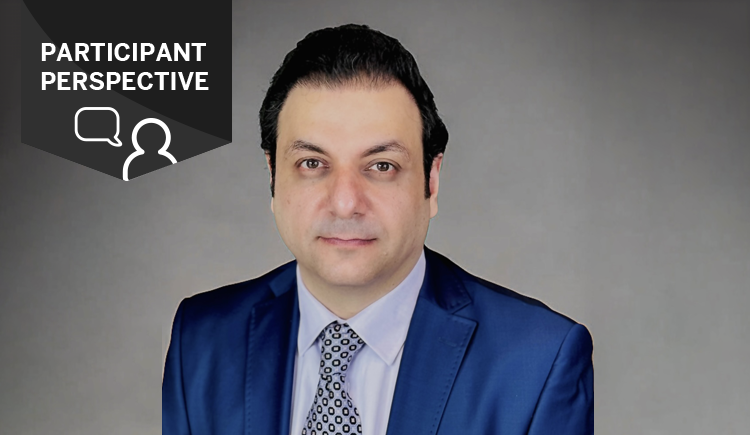
As part of our ongoing webinar series, Addressing Health Disparities: Clinical Insights on Race and Social Justice, J. Kevin Tucker, MD along with Ajay Singh, MBBS, FRCP, MBA, spoke with Sachin Jain, MD, MBA. During Dr. Jain’s residency training in 2013, he penned the essay, The Racist Patient in the Annals of Internal Medicine, based on his experience caring for a patient with racist beliefs. Now a leader in health care himself, Dr. Jain spoke about his own experiences navigating medicine as a person of color, and how health care leaders can build, empower and support diversity within their organizations.
The following article is an excerpt from their conversation and was adapted for the written format. Information regarding COVID-19 has rapidly evolved. The content in this article provides a historical snapshot of events surrounding the date of posting.
Dr. Singh: Since you published your article in the Annals of Internal Medicine, how do you think health systems are adapting to race and social justice issues?
Dr. Jain: As a health care system, we have a tendency to make everything our responsibility. Patients don't have housing, we're going to fix their housing problems. Patients are racist, we're going to make them not racist. We can't go quite that far.
However, we can ensure that we support the right things happening within the walls of the institutions that we lead. That means that we have just hiring practices. It means that when incidents do happen, there is appropriate institutional response. That we ultimately stand behind people who are victims of racism, whether they are patients or clinicians.
In our profession, we've accepted for years that the patient is always right. It's part of the hidden curriculum in medical schools. In some ways, if the patient is wrong, it's our job to judge them for being wrong.
We have to adopt a social justice model of conduct for both staff and patients to have respectful interactions. These interactions are the foundation of great clinical care. Since 2012, a number of institutions have published policies on how to manage incidents of bias, race, and discrimination.
But the gap is really around tangible, meaningful leadership action and behaviors. We have to hold organizations to a much higher standard. Institutions in the medical profession are social justice institutions, whether we want them to be or not. We're distributing social goods to people who need them. We have to do so in a way that is free of racial bias.
Dr. Tucker: We tell our young men of color to strive. That getting a good education will get them somewhere. But then, even when someone like you who's achieved many milestones still faces blatant racism, it really makes you pause.
Dr. Jain: Part of the institutional code that we're running up against is to not speak up. When people ask me, what are the biggest opportunities to improve American health care, I stopped saying things like new payment or delivery models. Instead, I say things like, ‘we need better leaders.’ Because I see all around me instances where people who should have courage don't have courage and people who should be speaking up don't speak up. To me, that is our number one deficiency as far as driving towards a health care system that is fair, equitable, and safe.
We are taught in academic medicine that we need to study things to understand what works and what doesn't work. Lots of things that we know work are not deployed the way they should be because we don't have leaders who stand behind them.
That's what I think medical schools should be focused on, actually producing leaders who have the courage of their convictions to speak up and to stand out.
Dr. Singh: On the topic of leadership, I have a colleague who teaches leadership at Harvard Business School. I said to him, it's remarkable how few leaders of Fortune 500 companies have actually taken a stand on these types of social justice issues. And he said to me, it's not because we haven't taught our students that it's important to speak on these issues, it's because the culture in these companies precludes the ability for leaders to take that risk.
Is it truly that these leaders don't know what the right thing to do is? Or is it because the culture around them precludes them from speaking up?
Dr. Jain: Respectfully, I reject the professor's formulation, because part of our job as leaders is to change the culture around us and not to accept it as is. I truly believe that our job is to shape the environment. I think many of us who've tried to change things recognize that it's a long journey. Sometimes, it's writing something in 2013 that is discussed seven years later.
I do think that there is a fit between ideas and time. What you're seeing now is a convergence between the social unrest that we're experiencing nationally and ideas that people have expressed previously.
It's our job to consistently convey these ideas to create the momentum and the external environment to where the conditions will arrive at a higher level.
Dr. Singh: I think my colleague was saying that they do teach on these issues. But it's the corporate environment, boards, and others who say, ‘don't rock the boat.’ You're saying, if you want to be a leader, you've got to be courageous. Courage is a key ingredient to leadership. Is it not?
Dr. Jain: It is, and it's painful. It comes with a lot of bumps and bruises. If you want to create real change, it's not going to be a straight line.
When people realize there is going to be personal sacrifice to speaking up, to speaking out, to standing behind people who others aren't standing behind, then they walk away from the challenge.
Now, one of the things that's most awkward, frankly, is for people who aren't minorities to speak up in a powerful and meaningful way. I think there's this question of, ‘Is it my place? Is it my responsibility? Can I speak authentically about these issues?’
I think when we look deep inside our hearts, regardless of our race or our color, we've all felt excluded. We've all felt like we've been invited to the party, but we haven't been asked to dance.
There is an opportunity for us to empower people who traditionally have not felt comfortable speaking up. Sometimes that means empowering Caucasian people to speak up on behalf of other types of people. That's often a very risky notion, but again, it is needed more than anything.
I’m encouraged by how many new folks over the last several years have taken on this mantle. The question is, can we have more? Because that's going to create social change. That’s going to create the norms that we need for the workplace to be safe for patients and the people who are delivering the care.
Dr. Tucker: If our institutions have such disparities in representation, how do we as organizations begin to address some of these issues?
Dr. Jain: I hate to be a broken record, but it goes back to representation and leadership. This is something I'm thinking about a lot, as I now lead SCAN Group and Health Plan. We have to reflect the communities that we serve. If we don't have people in leadership who come from and are representative of the community, we will have massive blind spots.
I don't think people in leadership are actively unconcerned about staff members coming from underserved communities. But they may not think about these issues, because they may not know about them. I'm not shy to say I have a very privileged background, but what I will say is over the years, I had a number of experiences that gave me exposures to backgrounds that were unlike my own.
When you become a leader of organizations like SCAN, you ultimately have to understand that you're not just a service provider. You are a pillar in the community. You are an employer. And as an employer, you have to take care of your employees.
Usually the difference between a really great organization and a not great organization is how concerned leadership is with their employees.
I think that part of leadership in health care in 2020 is understanding the demographics of the community. You serve not at a surface level, not from just a data perspective, but by actually meeting with people in the community to understand their issues. That is what is going to allow you to build solutions.
Dr. Singh: We consider ourselves the healing profession, yet there's a lot currently broken with respect to racial strife. How do you feel about physicians and people in the health care profession speaking out?
Dr. Jain: The notion that physicians should not participate in social activism is an outdated one. If you're in the healing professions, you're at the top institutions in the world, you're in the top 5% of earners in the country and you won't speak up, who will? Who is in a better position to speak up safely than people in medicine and the healing professions?
As physicians, we are highly educated. One of the most beautiful things about our profession is it gives us a deeper understanding of the human condition. And so, it creates some leadership obligations and opportunities.
I think of people like Esther Choo, an emergency room physician at Oregon Health Sciences University. She is a physician who uses her platform to try to change dialogue and to build momentum.
But actually, in many cases, speaking out at your own organization is far more powerful. Because over time, if we are on the side of justice, the side of equality, the side of creating opportunity for all, those are values that will win in the end.
At the end of the day, we all have an obligation to shine a flashlight on the injustice that exists around us. I think that's what being a professional in 2020 really means.
Dr. Singh: Especially, as the COVID-19 pandemic has impacted the lives of more than hundreds of thousands of people, including the impact to minorities, particularly Blacks, at a twofold higher rate. What can we do to mitigate that impact?
Dr. Jain: COVID-19 is a stress test on the US health care system. It is revealing how fractured our public health infrastructure is and the profound disparities that exist.
I'm hopeful that there will be work done over the next number of years to begin to correct some of the uneven distribution of medical care and of public health resources. Public health has been under invested in for decades in this country. We're now seeing the results.
But I think the outrage is what you're missing. Where is the outrage around what's happening? I think it's going to be a coalition of journalists, physicians, scientists, and health services researchers who are going to bring these issues to the fore.
We also have to think about other modes of creating change. It all starts with the little things we do every single day, the values we express, and the decisions we make.


